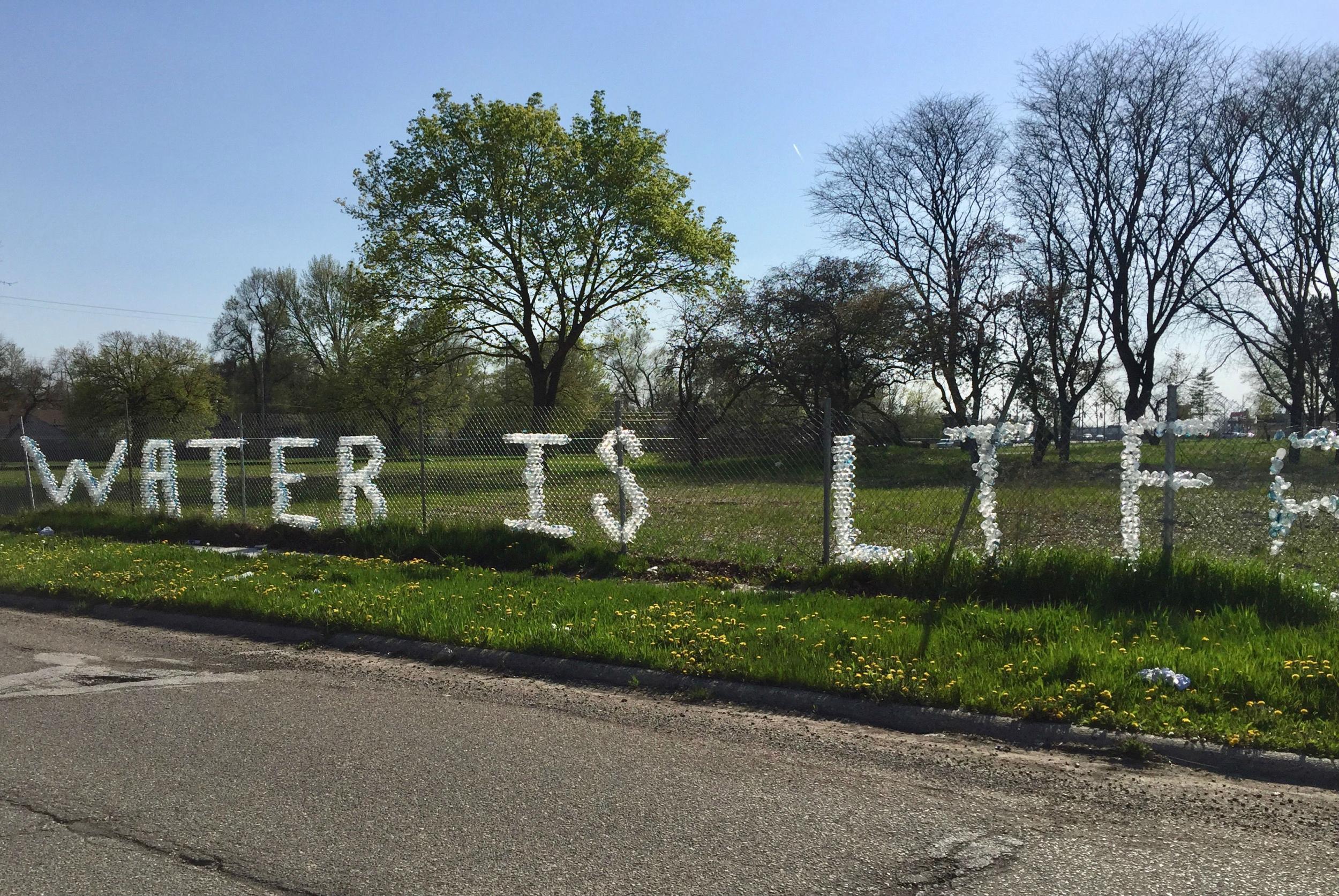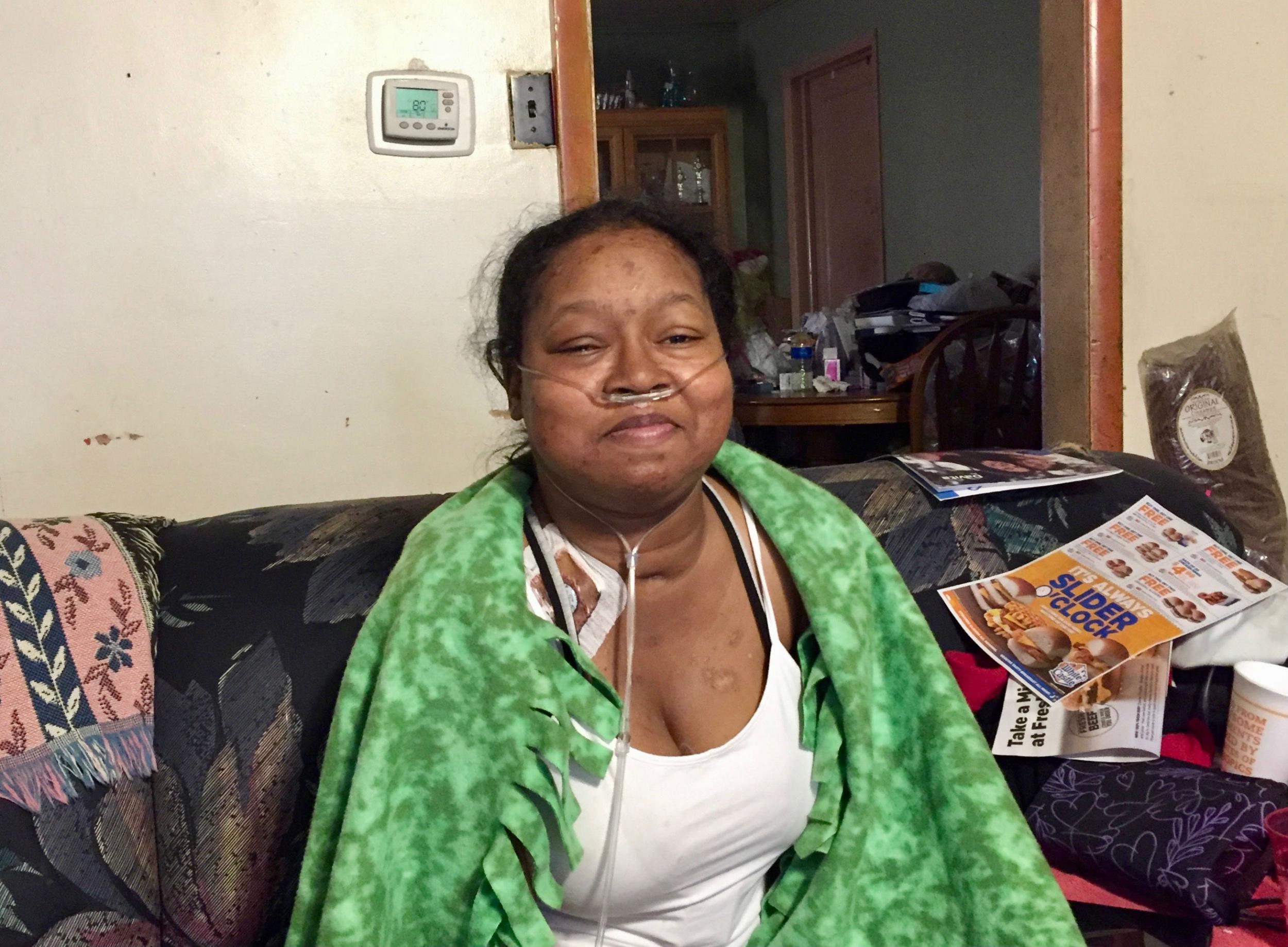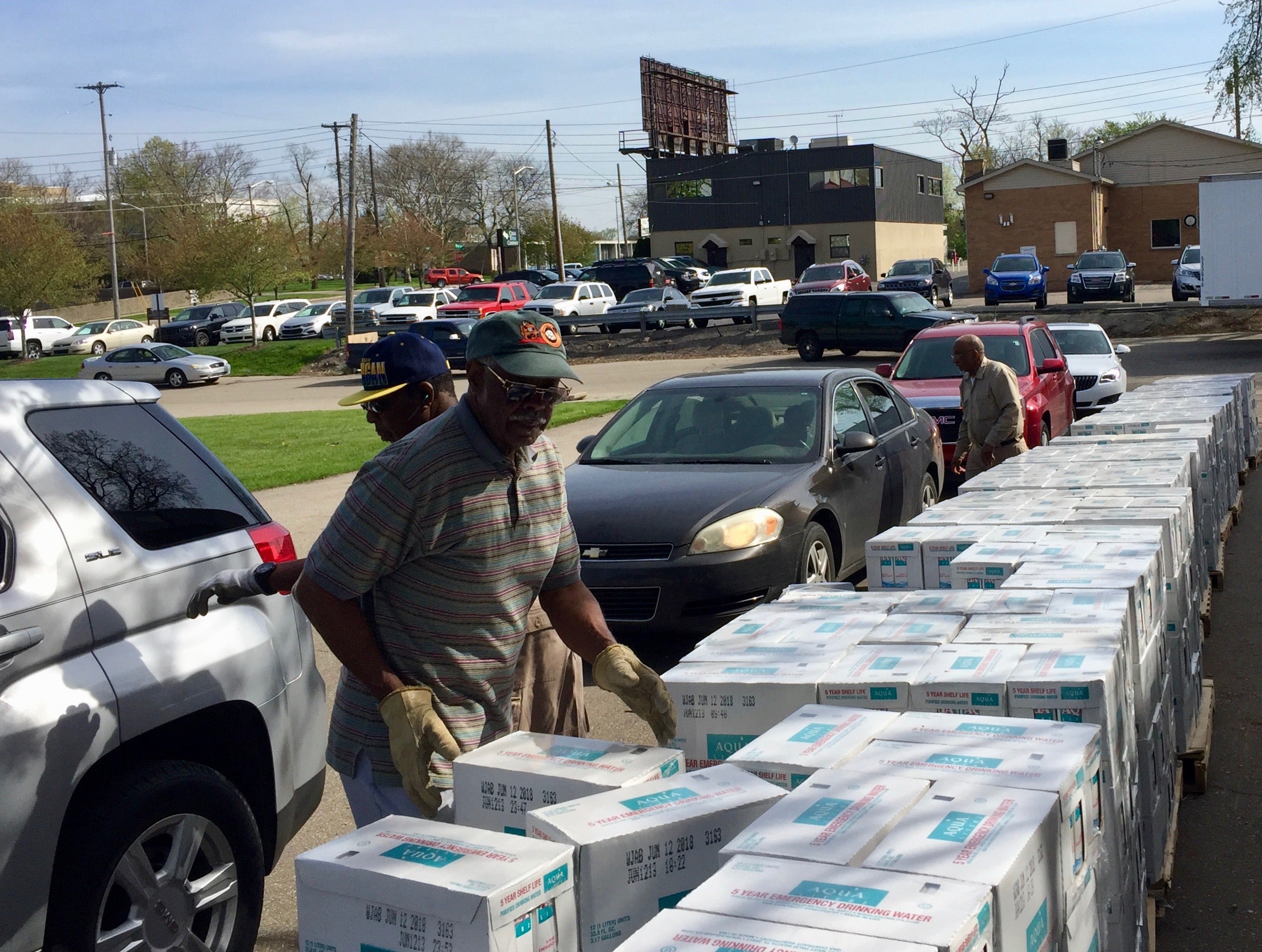Four years on, the people of Flint are still fighting for that most basic necessity – clean drinking water
Many people in the city say they will never drink tap water again
Flint native Jada Coleman decided to step up when she watched a Netflix documentary about her own city and felt it only told just part of the story.
It talked about the crime and poverty, the scandalous water crisis, and the way the city police force was responding. But it said little about its people, how they were suffering, and even less about the way residents were working to help each other when confronted by official deceit and failure. She had to do something.
It started with the 24-year-old graphic design student designing and selling T-shirts, with the intention of raising both awareness and funds. Less than three months later, her activist group 810H2O – 810 is the phone code for east Michigan – is helping organise the city’s young people, and her T-shirts are being snapped up by people across the country.

Four years after the Michigan city’s water supply was unintentionally poisoned, the events covered up and the physical and psychological health of its residents shaken to the core, Jada and her younger sister, Jallyah, are among dozens of ordinary people still fighting to provide that most very basic of needs – safe drinking water.
“I got the idea after Flint Town appeared on Netflix and I started watching it, and I was thinking it was just focussed on all the negativity,” Jada said, sitting outside her uncle’s house in Flint’s North End. “I wanted to find a way to show the positive things we’re trying to do. That was when we started the 810H2O movement.”
After the the state’s Republican governor Rick Snyder announced last month he had concluded the tap water was safe and he was stopping the supply of free bottled water, church groups and volunteers have been scrambling to fill the gap. The city government, which is also trying to start its own distribution, is considering suing the governor.
The activists include military veterans looking out for other former soldiers, mothers whose own family was poisoned by the lead, and amateur comedians doing standup charity nights. LeeAnn Walters, who helped reveal the danger of the city’s water and the cover-up by authorities, recently received the Goldman Environmental Prize, an award that recognises grassroots activism.
“The state is not being transparent and neither is the city of Flint,” said Ms Walters, referring to various claims being made about the water’s suitability for consumption.
The mother-of-four who educated herself about water safety and sought the help of Environmental Protection Agency (EPA) official Miguel del Toral, and Massachusetts Institute of Technology engineer Marc Edwards, to reveal what was going on. For three consecutive weeks in 2015, she worked almost without pause, to obtain more than 800 water samples from each the city’s zip codes, and showed many of them contained levels of toxins that exceeded what is officially classified as hazardous waste.
Of Mr Snyder’s decision to end the water supply, she added: “I asked why the state had taken away bottled water. I asked that question.”
Harm
Flint’s water became poisoned in 2014 when officials switched the city’s water source from Lake Huron to the Flint River, which is 19 times more corrosive, according to researchers from Virginia Tech. At the time, the city’s management was under state control and the step was taken to save money.
Almost immediately afterwards, people reported their water having a foul smell and being discoloured. Residents experienced rashes and hair loss. Estimates suggest up to 12,000 children were exposed to dangerous levels of lead.
The city was also struck by an outbreak of Legionnaires disease, which affected 87 people and killed 12 of them. The city received a state and federal aid package of $450m. Fifteen former and current state and city officials have been charged with criminal offences, ranging from willful neglect of duty to manslaughter.

Jassmine McBride came very close to becoming the 13th person to die from Legionnaires.
In August 2014, the young woman, who has diabetes, was in hospital for a check-up when doctors detected that her oxygen levels were very low. Eventually, she was rushed into the Emergency Room, where she had to be resuscitated. Her family was told she had Legionnaires disease, which experts believe was linked to the both the presence of metals in the water and an insufficient amount of chlorine, which is typically added to water as a disinfectant. She had to stay in hospital until Christmas.
Today the 28-year-old, who used to dance and sing with her church, spends her days in the family’s small house on a street of decaying or abandoned properties in the North End. She has crutches but struggles to walk more than a few yards, and uses an oxygen tank because both of her lungs were permanently damaged. She requires regular dialysis.
“I can’t work, I can’t do any of the normal things I used to do,” she said. The family said the area had become more dangerous and felt less hospitable over the past decade.
“There’s nothing for the children and people to do, so people look the other way or take a different path,” she said, a reference to the area’s reputation for high crime. At night, they hear the crack of gunshots.
While Flint’s lead problems have received widespread coverage, corrosive water can also release other metals, such as iron, which both promotes the growth of bacteria, including Legionella pneumophila, which causes a severe and dangerous form of pneumonia, but also inactivates chlorine, which is added to the water supply as a disinfectant.
Nick Lyon, the former Michigan Department of Health and Human Services director, is being tried for involuntary manslaughter in connection with the Legionnaires’ deaths. Preliminary hearings into the accusations are currently taking place in the city of Flushing.
He has denied any criminal wrongdoing, through his lawyers, and presented his own expert witnesses, who have testified that at least two victims probably died of other causes.
“They set a narrative when this started, and I said ‘This is not just about lead’,” said Art Woodsen, a 50-year-old US Army veteran, who helps deliver water to other former servicemen. “It’s about Legionnaires, copper, and carcinogens in the water.”
He added: “A lot of attention has been focused on the kids, but they poisoned everyone.”
Is the water safe?
When Mr Snyder announced on 6 April that Michigan was ending its supply of water to Flint, he claimed the “scientific data now proves the water system is stable and the need for bottled water has ended”.
“We will now focus even more of our efforts on continuing with the health, education and economic development assistance needed to help move Flint forward,” he claimed,
Karen Weaver, the town’s mayor, said when she complained and asked him to continue it at least until work to complete all the city’s pipelines have been replaced, she was told to “get over it”, a claim denied by the governor’s spokesperson.
Ms Weaver said she was only told of the governor’s decision hours before it was announced, a claim some activists have disputed. She said she was now considering suing the governor’s office.
The mayor said she believed the water provided to people’s taps was safe, if they made use of a filter. Yet she said she encouraged people to get it tested, either by the city government or a private tester, if they had doubts.
A spokeswoman for Mr Snyder’s office said the provision of free bottled water had continued seven months longer than it was legally obligated to, since two consecutive six-month monitoring periods showed the city’s water system was in compliance with the federal standards.
“The state continues to fund free water filters and filter replacement cartridges for all residents, even those who have already had their service lines replaced,” said the spokeswoman.
Yet, activists have criticised Mr Snyder’s move to terminate the free water, something exacerbated by the state’s decision to allow Nestle to double the amount of water it pumps from a spring in the north of the state to 400 gallons per minute. The company, which pays a fee of just $200 each year to the state for the water it pumps, is to provide 100,000 bottles to Flint each week for free distribution.
The National Resources Defence Council, an environmental group, said the people of Flint “deserved better”.
Cyndi Roper, the NRDC’s senior advocate for Michigan, said results of tests carried out by Susan Masten from Michigan State University, part of the settlement of lawsuits by residents, could only reveal so much, as they were only designed to test for lead and copper levels, not other contaminants. She said that while lead levels appeared to have fallen, “these results do not show that water in Flint generally is “safe” or “unsafe”.

She added: “No amount of lead in drinking water is safe.”
Given all that, the fact the residents of Flint should still feel the need for bottled water is entirely understandable. The governor may say the tap water is safe, the city’s mayor may say it is safe if people use the filters provided, but very few people believe them.
Indeed, during three days in the city, only two people out of several dozen interviewed by The Independent said they drank tap water. One of them, Ms Weaver, was the mayor.
For the vast majority, it seems, part of daily life now involves obtaining bottled water, either buying it or collecting it from the groups still providing it.
Even when they leave the city, or even go out of the state, many are reluctant to drink from a tap, something they pass on strongly to their children.
“Me, I most definitely don’t drink the water. I don’t trust the people in office,” said Tom Norman, a landscaper, who was filling up his pick-up truck with petrol in the North End.
“If I went to Atlanta, I would still be hesitant to drink the water. I’m not saying there’s anything wrong with the water. I just feel I can’t trust anything.”
Church groups
Floyd Burns moved to Flint from Alabama in the early 1960s, a time when well-paying jobs in the auto industry were easy to find. He spent 43 years with General Motors, which was founded in Flint in 1908 and which, at the peak of the city’s fortunes, employed as many as 80,000 people.
From 1931 to 2007, GM was the largest car manufacturer in the world and was credited with turning Flint into a prosperous, thriving city of 200,000, the embodiment of the middle class American dream.
Those days are long gone, along with the vast majority of the manufacturing jobs. The most recent census suggested that, in a city that is 57 per cent black, 37 per cent white, 4 per cent Latino and 4 per cent of mixed race, at least 41 per cent of residents live below the federal poverty level.

For the past four years, the now retired Mr Burns has been among the volunteers distributing water at the First Trinity Baptist Church. After Mr Snyder stopped the supply of free bottles, the church is one of just a handful of places that provide them, able to do so because of donations from across the country.
He said even if the water was safe – he said he had been drinking bottled water for 15 years – the authorities faced a huge challenge in trying to win back credibility in the eyes of citizens.
“People don’t have the trust because they let them drink the bad water for so long,” he said, loading cases of water in the rear of people’s vehicles. “It’s going to take a lot.”
One of those stocking up was Robert Person, who had arrived in a battered pick-up with two friends. All complained about the tap water being too toxic to even wash with. “It causes bumps on the skin,” said a middle-aged woman in the passenger seat. “It makes your skin feel like an alligator’s.”
Nobody is laughing
Lashaya Darisaw wants to bring about change by getting elected to the state legislature. The political organiser and mother of 13-year-old daughter is running her own grassroots campaign and trying to raise awareness through social media and organising protests.
“People tell me I am providing a voice for the voiceless, but I disagree,” she said. “I am showing people how to have a voice.”
Earlier this year, Ms Darisaw led a protest inside the state legislature in Lansing, video footage of which went viral. “People go to the Capitol all the time, but we decided to have a protest inside the chamber,” she said, sitting at her kitchen table.
She said winning back people’s trust would take a long time. “Eventually, they will trust the faucet, but no time soon. Right now it’s ‘boil it, filter it, boil it again’.”
Because she realises the trust deficit crosses generations, she is encouraging her teenage daughter, Tiara, to be an activist herself and educate her friends about what is happening in their city.
“I’m starting a programme about how to pick elected officials,” said the teenager, recalling how the water from the city’s taps ran brown at the height of the crisis. “People are not going to trust the government.”
Four years after the water crisis began, many in Flint feel the world has forgotten them, the media “moved on” to other stories.
Many were grateful their situation was thrust back into the spotlight by the American comedian Michelle Wolf, who performed at the annual White House Correspondents’ Association dinner earlier this year in Washington.
Each year, the group hires a comic to poke fun at the White House, the president and at the media themselves. The president usually attends, though Donald Trump has twice declined. This year, Ms Wolf received criticism from some for her comments about White House press secretary Sarah Huckabee Sanders who attended the event. Ms Wolf said Ms Sanders is frequently accused of not being entirely honest with the media.
“I actually really like Sarah. I think she’s very resourceful. She burns facts, and then she uses that ash to create a perfect smoky eye. Like maybe she’s born with it, maybe it’s lies. It’s probably lies,” she said.
Yet in this city, if people heard about Ms Wolf’s routine, it was because of her final line, which was most definitely not a joke: “Flint still doesn’t have clean water.” Ms Walters, the winner of the Goldman Environmental Prize, said residents appreciated what she did. “People in Flint were so proud of her trying to shine light on the problem.”
Join our commenting forum
Join thought-provoking conversations, follow other Independent readers and see their replies
Comments